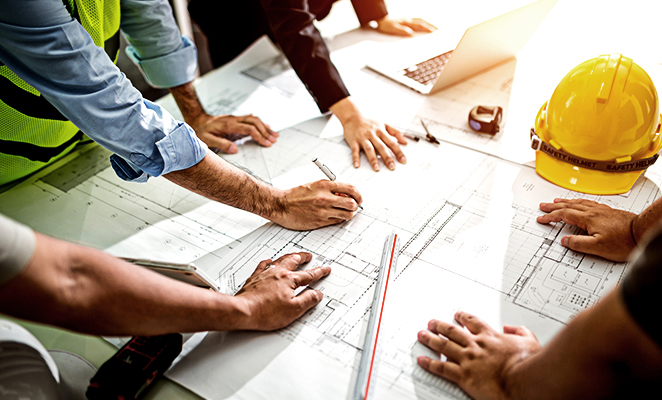
While construction is a nuts-and-bolts business—concerned primarily with precision, materials, and tools of the trade—total preoccupation with the nitty-gritty dimension of the job risks taking for granted the intangible human elements that are of equal, if not greater, importance to the work we do.
Trust is one of those key intangible elements, and new research by Autodesk FMI sheds light on just how important it is: A survey of 2,500 industry pros across the globe reveals that trust is a critical determinant in the happiness of employees, and it dramatically impacts performance in a number of mission critical categories. Yet only 63% of industry pros surveyed reported having a high level of trust within their organizations. As this new understanding comes into focus, the question then becomes clear: How does one go about building and maintaining trust?
But before we get to that, let’s take a closer look at why trust is an essential ingredient worth cultivating.
Trust in Construction
The role of trust in every kind of enterprise imaginable has been the subject of exhaustive studies for decades. And while trust is important in any workplace, there’s an argument to be made that this holds especially true for the construction industry.

In an environment where spinning saw blades, flying sparks, and other extraordinary hazards are commonplace, you need to know that the person working next to you can be counted on. Safety is paramount in the construction industry, and apart from strong policies and precautionary measures, workers need to be able to trust in each other’s individual competence and sound judgment in order to truly be safe. Moreover, they need to be able to trust that their employers have their best interests at heart: Nothing is more fatal to organizational trust than the credible erosion of leadership’s ability or interest in protecting its employees.
Those are a few of the reasons why trust is especially important in the construction industry. But like any organization, construction companies also require high levels of trust to achieve team unity. Whether on the jobsite or in the back office, team members need to trust each other enough to be able to freely and honestly voice their thoughts and ideas in pursuit of a shared objective.
The Measure of a High-Trust Construction Company
This isn’t just idle speculation. Trust itself can be elusive, even seemingly subjective, but its presence has measurable effects on the performance of a construction company. Autodesk’s research shows that 56% of professionals surveyed at high trust organizations reported lower employee turnover. This compared to only 16% at organizations with lower trust. In other words, high organizational trust can be correlated with more employees deciding to stick around for longer periods of time. At the organizations with the highest levels of trust, the research shows, this translates to an annual savings of about $750,000.

The financial impact of trust is a pattern that holds across industries. The Work Institute shows that each lost employee costs a company about $15,000. But this is far less of a concern at companies with a high level of trust. As a matter of fact, research shows that 74% of employees at high trust organizations would actually recommend their job to others.
How to Build Trust
Now that it’s clear how essential trust is to the health and success of a construction company the next question naturally is: How do you build it such that you’re able to portray your construction business as a trustworthy vendor that’s attractive future customers?
It goes without saying you’ll need to be able assure to your customers a certain degree of professionalism and quality they can come to expect when giving you their business.
But how do you prove, especially to a new prospect whose business you haven’t earned yet, that your word is your bond?
A good starting place in attempting to answer this question perhaps is to ask another: How open are you to working with others? This is, in many ways, the foundational question to ask for anyone looking to advance a relationship beyond mere transaction into the higher functioning realm of trust.
That’s because relationships built on trust are typically characterized by a high degree of collaborative effort. In fact, 43% of high trust companies name collaboration as one of the central engines that drives how they work. So, if you’re looking to kickstart the trust building process, begin by opening yourself up to a more collaborative work culture, and by emulating the practices of other companies that have already successfully done so.
Adopting a collaborative mindset is all well and good. But what kinds of concrete steps can you take toward building trust in your organization? Autodesk recommends the following three:
-
First, you need to gauge your current level of trust. You won’t be able to set benchmarks for yourself if you don’t know what the baseline is. One way to gauge trust is to survey your team members at different intervals and compare the results over time. Ask if they believe your company has a high degree of transparency, how often their expectations are met, and so on. Their responses can orient you to the current level of trust in your organization and help chart a course toward achieving even higher levels.
-
Second, be predictable. Research shows that one of the most important elements of trust is consistency. Which is to say that your team members need to be able to rely on each other’s performance and follow through. A good way to ensure high levels of predictability is to eliminate anything in your organization that causes uncertainty. In practice, this looks like being as transparent as possible with information, communicating clearly to your peers about roles and expectations, regularly supplying candid performance feedback, soliciting input from others, and establishing consistent internal processes.
-
Third, keep things simple. Construction is a complicated business with many moving parts, but streamlining can go a long way toward building trust. By keeping the weeds trimmed, you show your team members that you value their time and energy enough to prevent them from wasting it on inefficient processes. A good place to start is to make communication easier by creating a readily accessible and centralized hub where all the most important data about a project is stored. Expand your collaborative mindset by focusing on shared solutions and less on who’s to blame when things go wrong. And don’t be afraid to regularly negotiate with each other about how the work gets done and decisions get made as dynamics change over time.
What’s more, adopting equipment and smart tools with features like tool lockout can give owners peace of mind that dangerous table saws won’t accidentally harm someone on active jobsites after hours, while built-in reporting functionality can provide verification and proof of work to inspectors and clients that installations performed by subcontractors are to spec and not a liability to be worried about.
Above all, keep in mind that building trust can be a long and difficult process. But try to be patient with yourself and those around you. It’s worth the wait.
Wrapping It Up: Building Your Business into a High-Trust Construction Company
You can build trust by being transparent, predictable, and providing a seamless experience for your customers and prospects.
Remember, trust is an incredible gift to get from your customers and you should be striving to earn it. Because, after all, trust is more than earning their business—it helps you form a partnership, a lasting relationship you can grow for years to come.





